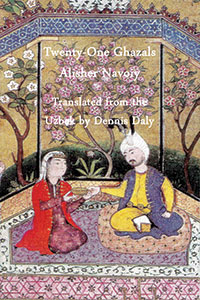
*
State Rep. Denise Provost reviews this latest collection of poetry by noted critic Dennis Daly:

Twenty-One Ghazals [of] Alisher Navoiy
Translated from the Uzbek by Dennis Daly
Cervena Barva Press, Somerville, MA, (2016)
While most collections of poems hold the potential for literary enjoyment, few prove to be the kind of treasure chest that Dennis Daly’s recent book undeniably is. It offers fresh translations of 500 year old poems by Alisher Navoiy, the pen name of Nizam al-Din Al-Shir. If you’re a reader of poetry, have an interest in the history of literature, or philosophy or religion, just buy this book. There are plenty of reasons to do so, and I’ll allow Navoiy to supply his own commentary to the reasons I list:
The Book is Visually Beautiful
From the detail of the Persian illuminated manuscript which graces the cover, it’s clear that this slim volume represents a portal into another world. The wealth of faithfully reproduced, full color illustrations which its pages are filled qualify Twenty-One Ghazals as an art book worth having. It’s almost a bonus to have the poetry it accompanies and contextualizes.
Bad luck taunts me. How I love your beauty!
Times over and over I have banished you
Forever, but then there was your beauty.
You’ll Discover a Gifted Writer Who May Be Entirely New to You
The jewel box of images is just the beginning of the allure. The big question for me was, who is this poet, and why have I not heard of him? Like most people of my generation, my education was tilted heavily towards the western canon, but fine writing from other parts of the world regularly becomes available in translation. Thanks, for instance, to the translations of Coleman Barks, the 13th century Persian mystic Rumi has become one of the most widely read poets in our country – but who has heard of Navoiy?
For many years as a recluse I hid away.
Do dreams and visions come to one seeking life’s pearl?
Not surprisingly Navoiy left for the desert
Seeking solace from passion’s impregnable pearl.
Although born almost 250 years after Rumi, Navoiy also lived in Central Asia, and came out of its Sufi tradition. Prolific and multi-talented, Navoiy worked as a public administrator, linguist, builder, painter, and political advisor, as well as producing many volumes of poetry and other writings. In this regard, he brings to mind such other polymath poets as Dante and Chaucer.
My misery, lyrical, flows gently inward
Turns rebellious stir into modulated life.
The thick ashes of ignominy fall, bring fluster.
In that moment all plainly saw my ruined life.
Learn About a Perhaps Unexpected Literary Tradition
Like Chaucer, Dante, and the Goliards, Navoiy preferred writing poetry in his native dialect, rather than Persian, the classical literary language of his time. It is perhaps because he wrote in the Turkic language Chagatai that Navoiy is so little known in the west. The existence of such a literature is one of the gems of discovery in this book provides.
May the innkeeper of our of our lives offer us room,
Invite us to the budding realm of latent joy.
You’ll Discover the Charms of a Particular Poetic Form
Another attraction of these poems is the use of the ghazal form. With roots in pre-Islamic Arabic poetry, the ghazal spread into Persia, then South Asia, through the influence of Sufi mystics. With its strict structural requirements, and typical themes of love and separation, the ghazal – sometimes compared to the Petrarchan sonnet – attracts those who aspire to the challenges of high poetic craftsmanship (Goethe was a fan, for instance.)
Wine! Give me more wine to face these solemn wonders
And duck the diving bats in this world of trouble.
The repetition of words within the ghazal form forces the skilled writer to break free of clichés, and allows for the development of extended metaphors. The “signature” couplets at the end of each require from the poet a particular self-awareness. Many ghazals can be taken apart to yield quatrains or aphorisms of lapidary quality.
The sun issues out its rays of sadness
And we, like planets, revolve around hope.
Ultimately, the Poetry Itself is Stunning
Without Fortune and prospect, I ignite the fire
Of impatience – the guards of prudence have vanished:
My caravan defenseless in the coming fire.
A lightening flash has struck and changed me utterly
As rushes burst and spread in a sea of fire….
Understand, Navoiy, I deny my suffering
As the Masandran forests turned red with fire.
Like those of Rumi, and certain other poets, Navoiy’s poems go beyond surface splendor into deeper levels. Delightful on first reading, they yield more with repetition. This book is a keeper.
— Denise Provost












Reader Comments